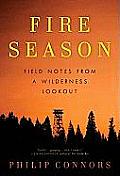
When people learn I've had a summer career as a fire lookout for the last nine years, their curiosity is piqued. The first question tends to go something like this: How do you keep from going crazy up there?
In a word, baseball.
Of course, I have various strategies for entertaining myself — Frisbee golf, solitaire, novels of urban ennui — but living as I do on a big mountain overlooking vast stretches of New Mexico desert, I'm blessed with pretty good reception on my AM/FM radio. When the weather is right I can tune in Major League games from at least one of three neighboring states: Texas, Colorado, and Arizona. I'm not a fan of the Rangers, Rockies, or Diamondbacks — my team is the Twins — but I am a fan of radio baseball: one of the most civilized means of whiling away time known to man.
Growing up on a hog farm in southern Minnesota, I listened to Frank Quilici and Herb Carneal call Twins games on WCCO, the powerhouse AM station out of Minneapolis. Baseball was the aural background of our lives, all summer long. Day games were more common back then, so we kept a radio on in the tractor, in the shop, and in the kitchen — any place where we were working, or eating, or just relaxing. But my favorite broadcasts were West Coast night games, for which I'd keep a portable Philco under my pillow, secretly following the action long past my bedtime. To this day I can remember Kirby Puckett's debut in the Majors in early May of 1984, when he went four-for-five against what were then called the California Angels.
Part of the joy of baseball on the radio is the almost liturgical recitation of names, beginning with the lineups — names which, over time, become joined in the mind of the listener with quirks and patterns of behavior: the guy you just know will swing at the first pitch, or the guy who always throws a slider when he's ahead in the count. When I was a child I'd try to imagine what Bombo Rivera looked like, or Butch Wynegar — great, evocative names whose faces were unknown to me until I earned some spending money for baseball cards.
For me, and I suspect for many others, the true beauty of baseball on the radio resides in the pact of trust between announcer and fan. Who anymore — aside from that perverse caricature self-identified as a Dittohead — trusts every word out of the mouth of someone paid to jabber on the radio for three hours each day? Yet that's exactly what we do with good baseball announcers.
Through the medium of that play-by-play voice, we draw a picture in our minds of a little white ball being thrown and batted around a grassy field. We see the third baseman dive toward the line, the center fielder leap against the wall — and we implicitly trust in language to evoke in our imaginations, far from the scene of the action, a boys' beautiful game played by men.
Nights when the loneliness creeps up, I turn the dial in almost imperceptible increments until the sounds of a game tune in. On the rest of the spectrum it's all preachers of salvation, preachers of doom, bad songs I've heard a hundred or a thousand times. Then, out of the static, unmistakably, comes a voice of calm. The field of play is easily called up in my mind: the grass is cut, and the chalk lines are sharp in the dirt. With the help of that friendly voice, I'm about to witness some magic happen there.
In certain self-indulgent moods I like to think it's a kind of magic I practice myself, though on a very modest scale and not very often. Think of my lookout tower as a kind of press box. The game out my windows is played by nature, when lightning strikes a tree and the first few tendrils of smoke rise up. When I make the call to dispatch on my two-way radio and say the words "smoke report," I can sense the expectation in the ears of everyone scanning that frequency. Where will the smoke be? How big is it? Those brief moments of suspense can be likened, by this reckoning, to the ones that follow a rising voice saying, "High fly ball, deep left field, slicing toward the corner... "
The analogy falls apart when you consider I have no color man next to me, no responsibility to talk for hours, and no audience beyond a few dozen of my Forest Service colleagues. I'm alone, and my infrequent radio performances last all of 20 or 30 seconds. Which, come to think of it, is just the way I like it.